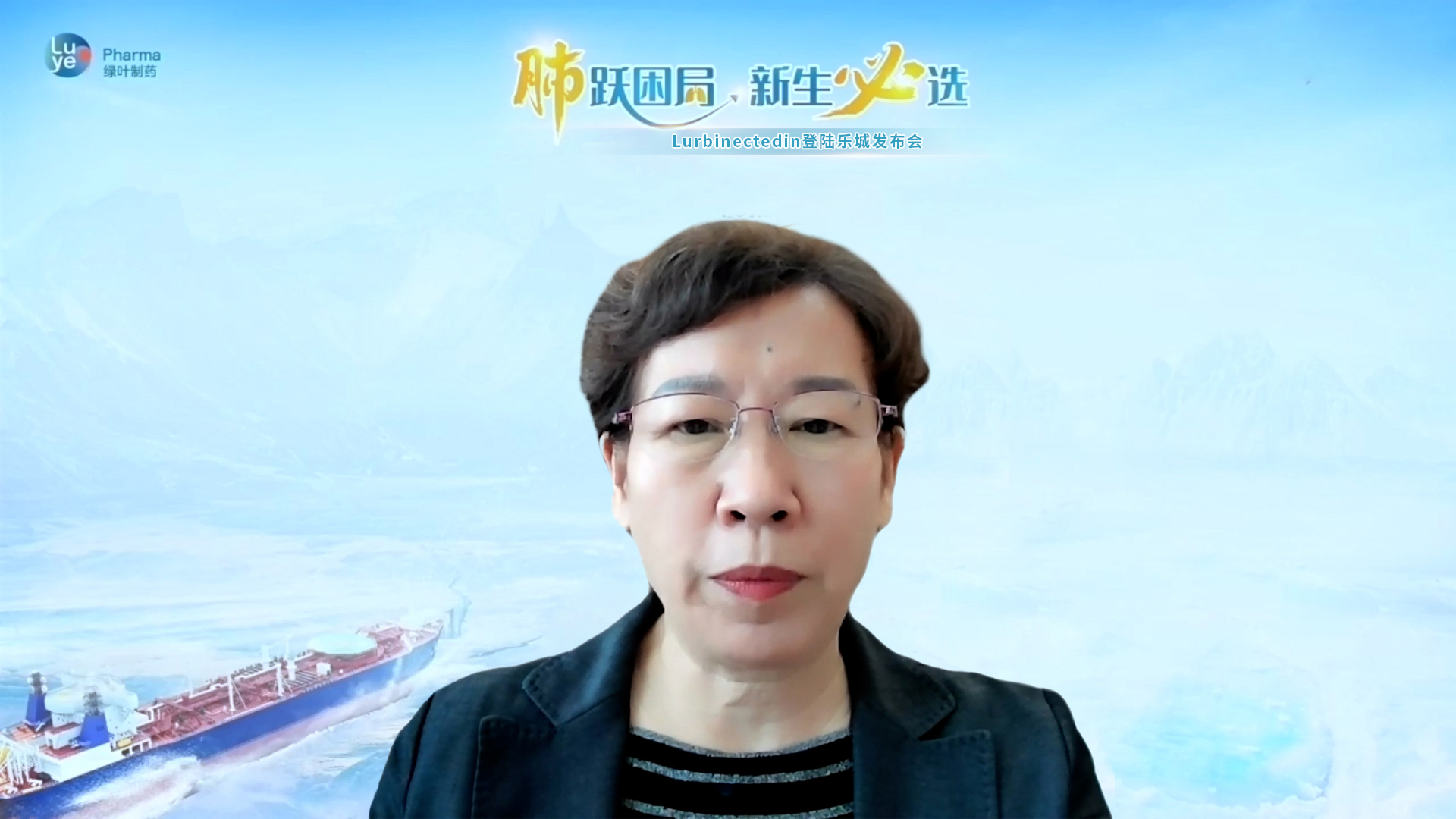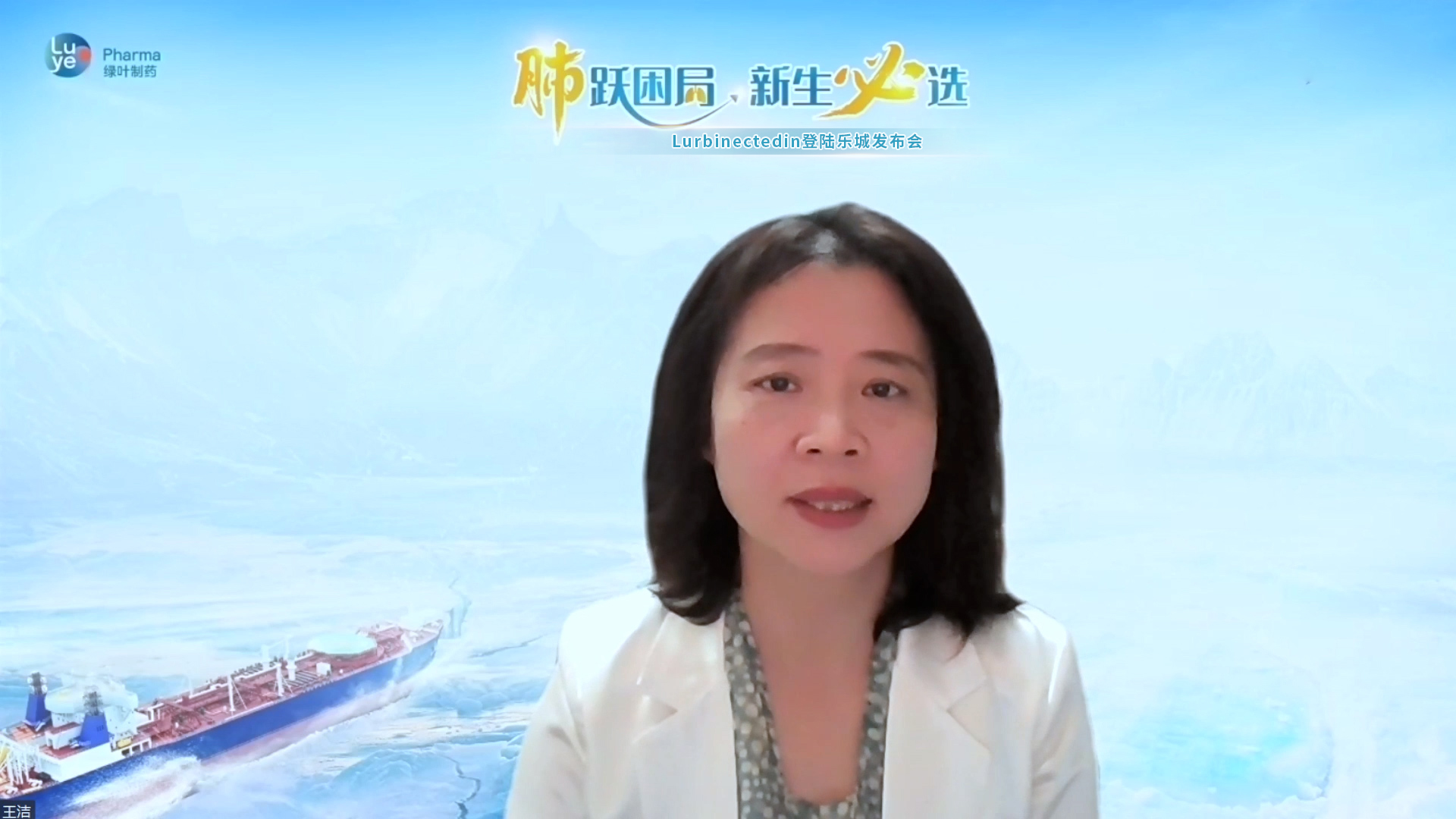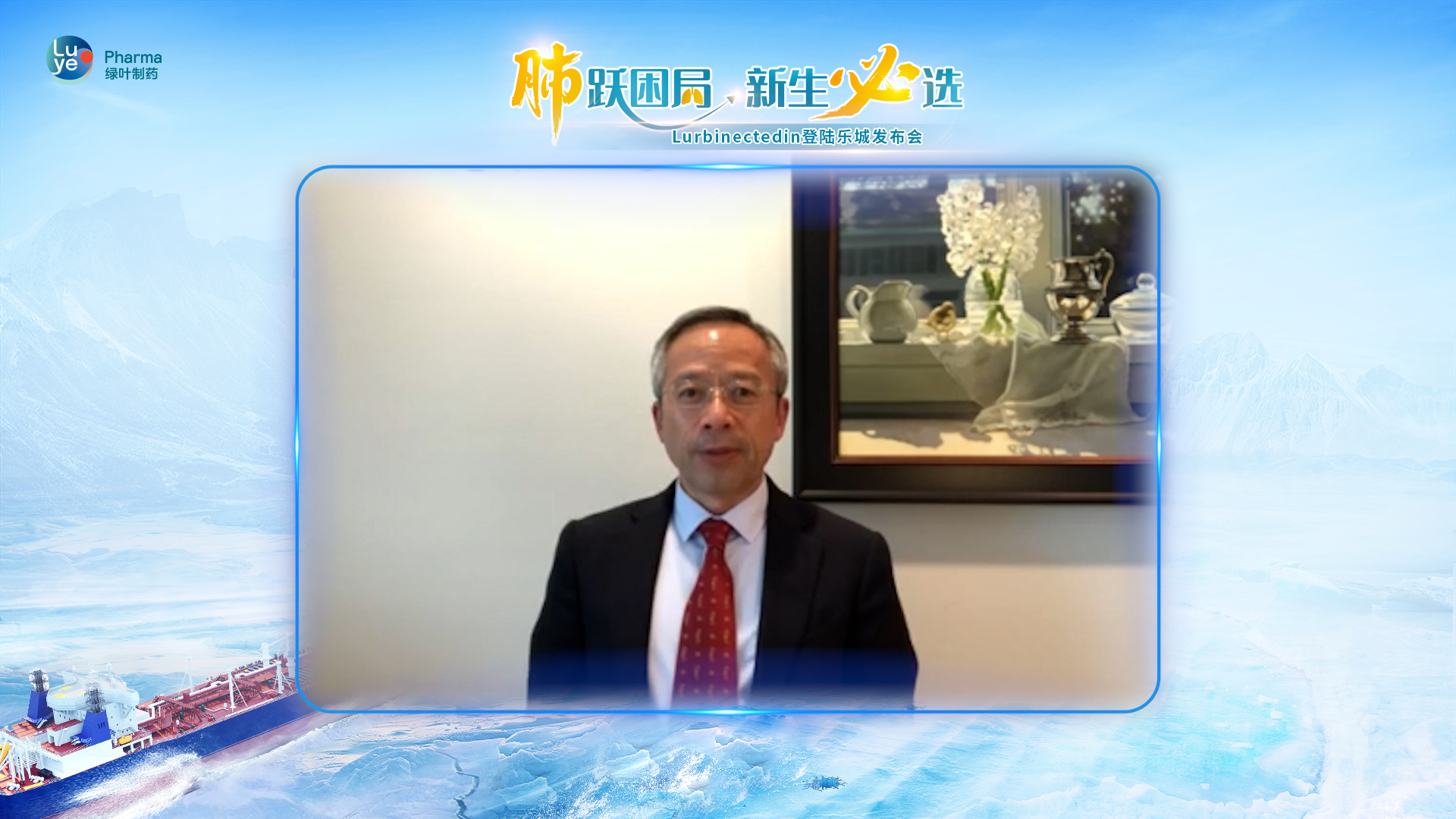News>Press Releases
Luye Pharma’s Innovative Anticancer Drug Lurbinectedin Officially Launched in Hainan
August 06,2022
- Breaking new ground for treating relapsed SCLC -
Shanghai, August 6, 2022 - Luye Pharma Group announced at a product launch conference on August 6, 2022 that Lurbinectedin, an innovative anticancer drug, has been officially adopted at the Boao Future Hospital located in the Boao Lecheng International Medical Tourism Pilot Zone of Hainan to be used as an urgently needed drug in clinical practice. The drug is approved for treating adult patients with metastatic small cell lung cancer (SCLC) with disease progression on or after receiving platinum-based chemotherapy. This was the first step towards meeting the unmet need for treating patients with relapsed SCLC in China.

(The Lubinectedin Launch Ceremony)
Thousands of experts attended the conference. A group of them discussed the clinical application and practices regarding Lurbinectedin, including Academician Yu Jinming from Shandong Cancer Hospital & Institute, Professor Cheng Ying from Jilin Cancer Hospital, Professor Wang Jie from the Cancer Hospital of the Chinese Academy of Medical Sciences, Professor Han Baohui from Shanghai Chest Hospital of Shanghai Jiao Tong University, Professor Wang Zhehai from Shandong Cancer Hospital & Institute, Dr. Antonio Calles from Hospital General Universitario Gregorio Marañón, Professor Wu Chunjiao from Jilin Cancer Hospital, Professor Fu Xiaolong from Shanghai Chest Hospital of Shanghai Jiao Tong University, Professor Shu Yongqian from Jiangsu Province Hospital, Professor Fan Yun from Zhejiang Cancer Hospital, Professor Zhou Ningning from Sun Yat-sen University Cancer Center, Professor Gu Kangsheng from the First Affiliated Hospital of Anhui Medical University, and Professor Zhao Jun from Peking University Cancer Hospital. The experts witnessed the milestone moment with government officials and Luye Pharma executives including Lv Xiaolei, Executive Deputy Director of the Administrative Bureau for the Boao Lecheng International Medical Tourism Pilot Zone, Yang Rongbing, President of Luye Pharma Group, and Li Li, Vice President of Luye Pharma Group.
Lurbinectedin is breaking new ground for treating relapsed SCLC
Lung cancer was China’s No.1 cancer in 2020 in terms of morbidity and mortality with approximately 815,000 new cases and 714,000 deaths that year1. Specifically, SCLC accounted for 13%-17% of all lung cancer cases2. Most SCLC patients are already in the advanced stage upon diagnosis, resulting in poor prognosis. Their five-year survival rate is only 7% or as low as 3% for those in the extensive stage3. Although SCLC is very sensitive to initial treatments, most patients would experience a relapse or develop drug resistance after initial treatments. According to statistics, approximately 75% of the patients with locally advanced SCLC and more than 90% of those with metastatic SCLC would relapse within 2 years after receiving treatments4. The high relapse rate of SCLC poses a significant challenge to its treatment, and innovative therapies are urgently needed in clinical practice.
Lurbinectedin is a selective inhibitor of oncogenic transcription. Its unique dual-action mechanism allows it to regulate the microenvironment for tumors, leading to the apoptosis of cancer cells, while inhibiting oncogenic transcription. In 2020, Lurbinectedin received the accelerated approval from the U.S. Food and Drug Administration (FDA) for treating adult patients with metastatic SCLC with disease progression on or after receiving platinum-based chemotherapy. It was the only new chemical entity approved by the FDA for the treatment of relapsed SCLC during the past 25 years.
The accelerated approval was based on the clinical data from an open-label, multicenter, and single-arm Phase II clinical study of Lurbinectedin in 105 adult patients with SCLC (including those who are platinum-sensitive and platinum-resistant) whose disease progressed after receiving platinum-based chemotherapy. In this study, patients treated with Lurbinectedin demonstrated an Overall Response Rate (ORR) of 35%, a median Duration of Response (DoR) of 5.3 months, and a median Overall Survival (OS) of 9.3 months. Specifically, in chemo-sensitive patients (CTFI≥90), the ORR of using Lurbinectedin alone was 45%, and the median OS was 11.9 months.

(Professor Yu Jinming, a member of the Chinese Academy of Engineering and President of Shandong Cancer Hospital & Institute)
“SCLC is highly malignant and aggressive. Patients often develop drug resistance and have a poor prognosis. A new second-line treatment, especially for resistant SCLC, is urgently needed. We are very excited to see that Luye Pharma’s innovative drug Lurbinectedin for treating SCLC is officially adopted in the Lecheng Pilot Zone. It will provide a new treatment option for patients,” said Professor Yu Jinming, who is a member of the Chinese Academy of Engineering and President of Shandong Cancer Hospital & Institute.
A clinical study in China demonstrated an ORR of 45.5%, indicating that Lurbinectedin is more effective for Chinese patients
At the 2022 annual meeting of the American Society of Clinical Oncology (ASCO), the preliminary results from a Phase I clinical trial of Lurbinectedin as a second-line therapy in Chinese patients with SCLC attracted a lot of attention from the experts. In this study, Lurbinectedin (3.2mg/m2) showed promising efficacy as a second-line therapy in Chinese patients with SCLC. It was confirmed by an Independent Review Committee that the ORR was 45.5% in all the subjects and over 30% in those with resistant SCLC, and the median Progression-Free Survival (PFS) was 6.6 months. In addition, Lurbinectedin demonstrated acceptable tolerability and a manageable safety profile.

(Professor Cheng Ying, Party Secretary of Jilin Cancer Hospital and Director of Jilin Cancer Center)
“It is the first study exploring the preliminary efficacy and safety of Lurbinectedin in Chinese patients. The efficacy of Lurbinectedin in Chinese patients with relapsed SCLC who had experienced progress after receiving the first-line platinum-based chemotherapy was comparable to its efficacy in the Phase II clinical study conducted overseas, and the response rate was even higher in Chinese patients. I believe that the adoption of Lurbinectedin in Boao Lecheng will be able to help increase the accessibility of this innovative therapy in China,” said Professor Cheng Ying, Party Secretary of Jilin Cancer Hospital and Director of Jilin Cancer Center.

(Professor Wang Jie, Head of Internal Medicine, the Cancer Hospital of the Chinese Academy of Medical Sciences)
“The release of the data from the Phase II clinical trial of Lurbinectedin conducted overseas provided a new hope for patients with relapsed SCLC. At this year’s ASCO annual meeting, we were excited to see that the drug demonstrated even better efficacy in Chinese patients. We look forward to seeing a bigger role of this drug in clinical practice,” said Professor Wang Jie, Head of Internal Medicine, the Cancer Hospital of the Chinese Academy of Medical Sciences.

(Professor Han Baohui, Head of Respiratory Medicine, Shanghai Chest Hospital of Shanghai Jiao Tong University)
In addition to being used as a single-agent second-line treatment, multiple studies are also going on internationally investigating the potential of using Lurbinectedin in combination with other therapies. At the roundtable session about the clinical application of Lurbinectedin in China, Professor Han Baohui, Head of Respiratory Medicine, Shanghai Chest Hospital of Shanghai Jiao Tong University, noted: “In addition to its approval as a second-line treatment for SCLC, Lurbinectedin still has a lot of potential, including being used in combination with chemotherapy, immunotherapy and radiotherapy as well as for other novel combination therapies. In using it with other therapies, we can explore more combination strategies that keep a balance between efficacy and safety for the benefit of more SCLC patients.” At the roundtable session, other leading clinical experts including Professor Fu Xiaolong, Professor Shu Yongqian, Professor Fan Yun, Professor Zhou Ningning, Professor Gu Kangsheng, and Professor Zhao Jun also shared their opinions on the recommended dosage and combination strategies for Lurbinectedin.
The pilot use of Lurbinectedin in Hainan helps to accelerate its accessibility to Chinese patients in general
Thanks to various pilot policies of the Hainan Free-Trade Port, Lurbinectedin was adopted at the Boao Future Hospital located in the Boao Lecheng Pilot Zone of Hainan first, so that Chinese patients can benefit from this internationally advanced new therapy without having to travel abroad.

(Lv Xiaolei, Executive Deputy Director of the Administrative Bureau for the Boao Lecheng International Medical Tourism Pilot Zone)
“I am very excited to see the successful adoption of Lurbinectedin in Lecheng Pilot Zone as a drug urgently needed in clinical practice. Through the joint efforts and close collaboration of Lecheng, Luye Pharma and others, I believe that we will be better-positioned to address the health and treatment needs of Chinese people,” commented Lv Xiaolei, Executive Deputy Director of the Administrative Bureau for the Boao Lecheng International Medical Tourism Pilot Zone.

(Yang Rongbing, President of Luye Pharma Group)
“Luye Pharma has been committed to developing, manufacturing and selling new anticancer drugs to address the unmet needs of patients in a patient-centric manner. Hainan is the first stop for us to serve China’s SCLC patients with Lurbinectedin. In March this year, we submitted a New Drug Application (NDA) for Lurbinectedin in Hong Kong, and will submit another one for it in Chinese mainland soon. We are accelerating the development of Lurbinectedin, hoping to provide a new therapy for Chinese patients as soon as possible,” said Yang Rongbing, President of Luye Pharma Group.
###
About Lurbinectedin
Lurbinectedin is an analog of the marine compound ET-736 isolated from the sea squirt Ecteinacidia turbinata in which a hydrogen atom has been replaced by a methoxy group. It is a selective inhibitor of the oncogenic transcription programs on which many tumors are particularly dependent. Together with its effect on cancer cells, Lurbinectedin inhibits oncogenic transcription in tumor-associated macrophages, downregulating the production of cytokines that are essential for the growth of the tumor.
To date, Lurbinectedin has received marketing authorizations in the U.S., Australia, UAE, Canada, Singapore and Qatar for the treatment of adult patients with metastatic SCLC whose disease has progressed during or after receiving platinum-based chemotherapy. Lurbinectedin is also recommended by Small-cell lung cancer: ESMO Clinical Practice Guidelines for diagnosis, treatment and follow-up (published in 2021) and the NCCN Guidelines for Small Cell Lung Cancer (2022). Luye Pharma Group owns the rights to develop and commercialize Lurbinectedin in China.
____________
References:
- International Agency for Research on Cancer – Population Fact Sheets – China. Available at https://gco.iarc.fr/today/data/factsheets/populations/160-china-fact-sheets.pdf. Accessed in August 2022.
- The 2022 Guidelines of the Chinese Society of Clinical Oncology (CSCO) for the Diagnosis and Treatment of Small Cell Lung Cancer. People’s Medical Publishing House. 2022
- Cancer.Net. Lung Cancer - Small Cell. Available at https://www.cancer.net/cancer-types/33776/view-all. Accessed in August 2022.
- Rudin CM, et al. Nat Rev Dis Primers. 2021 Jan 14;7(1):3.

